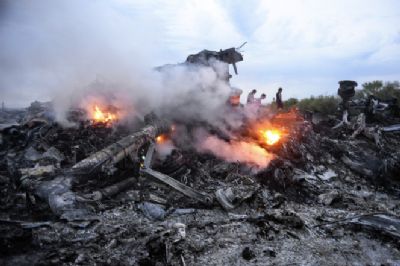The missile that shot down Malaysia Airlines Flight 17 in 2014, killing all 298 people aboard, was fired from a launcher that had been moved from Russia into rebel-held territory in eastern Ukraine, victims' relatives said Wednesday.
The families were informed of international prosecutors' findings shortly before a news conference was due to start in the central Dutch city of Nieuwegein on the outcome of the probe into the July 17, 2014, crash.
A surface-to-air missile exploded a few feet from the Boeing 777-200's cockpit at 33,000 feet during its flight from Amsterdam to Kuala Lumpur with mostly Dutch citizens aboard, Hans de Borst, whose 17-year-old daughter was killed, said he and other family members were told investigators had proof - including communications intercepts and radar data - that the mobile BUK missile launcher was returned to Russia after the jet was destroyed.
Thomas Schansman, father of the only US citizen killed in the disaster, earlier said he expected investigators to identify which specific weapon they believe destroyed the airliner and where it was fired from.
Russia has repeatedly denied allegations that pro-Moscow rebels in eastern Ukraine were responsible.
At the time of the downing, pro-Russian separatists were fighting Ukrainian government forces in the region. The plane's wreckage was strewn over several miles of fields in rebel-held territory.
On Monday, the Russian military said it had new radio-location data that show the missile did not originate from rebel-controlled territory, and said it would turn the data over to Dutch investigators.
"If there was a rocket it could only have been launched from a different area," Kremlin spokesman Dmitry Peskov told reporters, referring to Russian radar data. "You can't argue with it, it can't be discussed."
In the Joint Investigation Team, Dutch authorities and judicial officials have been working with counterparts from Australia, Belgium, Malaysia and Ukraine to gather the best possible evidence for use to prosecution the perpetrators.
Prosecutors cannot file charges because there is no international agreement on what court a case would be heard in.
Dutch police spokesman Thomas Aling said the joint probe findings differ in that they are designed to be solid enough to be used as evidence in a criminal trial.
Robby Oehlers, the cousin of victim Daisy Oehlers, 20, said investigators also had identified 100 potential suspects in the disaster, Reuters reported.
Silene Fredriksz, whose 23-year-old son Bryce was on the jet with his girlfriend, Daisy Oehlers, expects the investigators to say the missile was fired from the rebel-held town of Snizhne.
"We will be able to deduce whether it was Russian or Ukrainian. And I think we will just get a confirmation of what we have thought for months: that is was the prior," Fredriksz said before meeting investigators.
"This is an important step. As a family we are impatient. We want to know what happened, how it happened and why. We want those responsible to face justice," she said.
If the probe confirms that theory, which is supported by photographic evidence and witness statements collected by Reuters, it will contradict Moscow's suggestion that the Boeing was brought down by the Ukrainian military.
At the time, the nearest Ukrainian-held area was about 3.7 miles away.
The downing played a significant part in a decision by the European Union and the US to impose sanctions on Russia over the Ukraine conflict.
Last year, a probe by the Dutch Safety Board concluded that the airliner had been downed by a Russian-made BUK missile launched from eastern Ukraine.
September 28, 2016
Missile that Shot Down Malaysian Flight Came from Russia: Probe
Date
September 28, 2016
Title
Missile that Shot Down Malaysian Flight Came from Russia: Probe,
The New York Post
Author(s)
Yaron Steinbuch
Original Source

